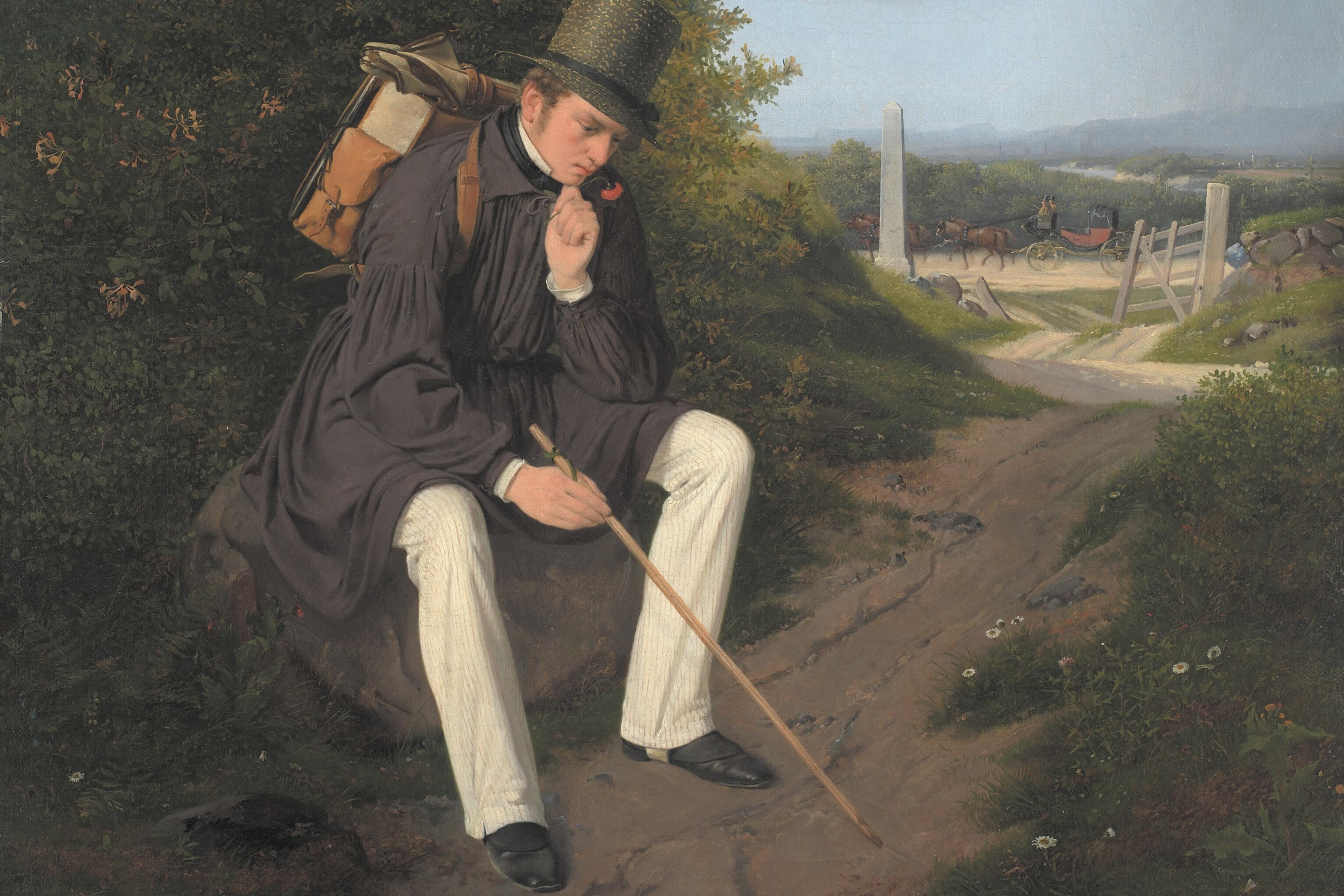Friedrich Nietzsche’s well-known reputation as a philosophical provocateur is partly the result of his commitment to disabusing his readers of a variety of beliefs: their beliefs in a higher purpose, in an afterlife, in disinterested knowledge, in the absolute value of ‘virtues’ such as compassion, and more. But he does not reject these beliefs merely because he believes they are false (he does) or because he hopes to disrupt the dominant belief system in 19th-century Europe (he does). He rejects these beliefs because he thinks they constitute a clear and present danger to his readers. Such beliefs not only deny life and devalue human existence, they also imperil our psychological wellbeing. To understand why he thinks so requires us to understand his diagnosis of these beliefs as nihilistic.
‘Nihilism’ is used today to designate a wide range of attitudes. Nihilists are often typified as those who hold certain beliefs about life’s purpose or significance: they believe that there is no purpose or ‘point’ to life, or that nothing matters. Alternatively, nihilists might be distinguished from non-nihilists by their alleged lack of any belief whatsoever: as represented by the Coen Brothers in their film The Big Lebowski (1998), nihilists might ‘believe in nothing’. Other times, nihilism is characterised as involving an absence of commitment to moral values, like the character of Anton Chigurh from Cormac McCarthy’s novel No Country for Old Men (2005) who rejects all notions of right and wrong. According to these popular understandings, nihilism involves the disavowal of various beliefs and values. It is a cognitive phenomenon involving abstract and highly intellectual stances.
According to Nietzsche, however, these intellectual stances do not by themselves count as manifestations of nihilism. As presented so far, there is a key element missing. On Nietzsche’s view, the beliefs that there is no point to life or that there are no moral values become nihilistic only when the individual holding such beliefs finds in them a reason for rejecting life and existence as a whole, for disavowing or disengaging with life itself. Nihilism involves a fundamental repudiation of life itself. It is life-denial, the negation of life.
What does it mean to deny or negate life? To flesh out one sense of nihilistic life-denial, let us take the abovementioned belief that there is no overarching purpose to this life and world. On Nietzsche’s view, it’s quite possible to believe in the purposelessness of life as a whole without taking this belief as a reason to negatively evaluate life. (In fact, Nietzsche himself both holds this belief and positively evaluates life; he thinks that, even without an overarching purpose in which all human beings participate, life is well worth living!) But if an individual thinks that life is worthwhile only if there is some higher purpose to it, and they come to believe that there is no such purpose, this latter belief will serve as a reason for finding life not worth living. In this case, since the individual’s belief in the purposelessness of life leads to a negative evaluation of life itself – thus serving as a reason to deny life – Nietzsche would designate the belief nihilistic. In this first sense, then, nihilistic life-denial involves negative judgments of life and existence: that existence is not worthwhile, that life is not worth living, or that it would be better not to exist.
Understanding nihilism as life-denying in this first sense allows us to recognise one of Nietzsche’s most striking insights: if life-denial involves the negative judgment of this life and world as they actually are, then even beliefs and values that we typically understand as bestowing meaning and value upon life can function as covertly nihilistic. Let us return to the individual who believes that life is worth living only if there is some higher purpose to it, in which all human beings participate. For such an individual, it is not only nihilistic to disavow her belief in a higher purpose; it is also nihilistic for her to believe in a higher purpose. After all, Nietzsche argues, if we think life is worth living only if there is a higher purpose in which we participate – and it turns out that there is no higher purpose in which we participate (something that Nietzsche insists we must accept) – then one’s belief in a higher purpose is life-denying because it implicitly devalues life as it actually is (that is, as devoid of higher purposes). In other words, given that there is no higher purpose, belief in a higher purpose as that which is required to make life worth living covertly devalues life: it indicates that life, as it actually is, is not worth living.
So far, nihilism has been presented as a cognitive phenomenon involving various belief-states and the absence of certain value commitments. In order to understand a second sense of nihilistic life-denial in Nietzsche’s thought – and, in turn, to understand why Nietzsche presents nihilism as a terrible problem – we must look to his analysis of nihilism as a psychological phenomenon. Any belief or judgment involving a negative evaluation of existence as a whole – whether overt or covert – will be designated life-denying, and thus nihilistic, by Nietzsche. But he also thinks that such beliefs and judgments are life-denying in a much deeper sense: they either originate in or provoke various forms of psychological life-denial.
First, on Nietzsche’s view, life-denying beliefs and judgments tend to originate in individuals who are alienated from or averse to life and existence. This is what he intends to capture when he insists in The Twilight of the Idols (1889) that the same judgment of life that the ‘wisest sages of all times’ have reached – that ‘it’s worthless’ – originates in these individuals’ ‘fatigue with life’ and ‘hostility to life’. To judge that life, as it actually is, is not worth living is a symptom of a dangerous weariness with life, an inability to effectively engage with one’s world, grow in one’s form of life, and flourish. This holds regardless of whether such a judgment is covert (for example, if one believes in a higher purpose, and takes that as a reason to affirm life) or overt (for example, if one disavows a higher purpose, and takes that as a reason to reject life).
In fact, Nietzsche thinks that the adoption of life-denying beliefs is an unconsciously deployed coping strategy, utilised by individuals weary of life and unable to engage effectively with the world. And to some extent, this strategy works. If the disengaged, world-weary individual adopts the belief that there is a higher purpose to life around which she might meaningfully orient her life and action, she will likely experience an alleviation of her weariness with life and re-engagement with her world. Yet by adopting the belief in a higher purpose, Nietzsche argues that such a person is merely coping. While her investment in this belief secures her survival, it secures little else. Though she staves off that psychological form of life-denial Nietzsche deems ‘suicidal nihilism’, she is not thereby able to grow and flourish. (The distinction between ‘surviving’ and ‘thriving,’ typically invoked when responding to inquiries into our well-being, is apt here.)
In addition to having their origin in individuals suffering from ‘suicidal nihilism’, these life-denying beliefs tend to elicit an aversion to life in the individual who adopts them. This is a second way in which Nietzsche thinks negative assessments of life can be life-denying at a psychological level. Let’s return for a final time to the individual who believes that the value of life depends on the existence of a higher purpose. If such an individual comes to believe that there is no such purpose, this will be earth-shattering. It will also, Nietzsche thinks, elicit a host of emotions – despair, hopelessness, apathy, deep ambivalence, feelings of emptiness – and disruptions to the individual’s motivational life: she may experience irresoluteness, disengagement or resignation. Ultimately, these emotional and motivational disruptions undermine her will to live. In more precise Nietzschean terms, these disruptions undermine her ability to effectively engage her world, pursue her goals, and (as the scholar Ian Dunkle emphasises) grow in those pursuits. Since all living beings aim at these things, however, to be incapable of them is to fail to realise the most basic aims one has as a living being. It is this life-denying effect that the emotional and motivational disruptions above have on the individual who experiences them – this is how they undermine life itself.
This notion to which Nietzsche hopes to bring his reader’s attention – that a change in certain life-orienting beliefs or value commitments can provoke profoundly life-denying changes in one’s emotions and motivational states, and ultimately hinder one’s flourishing – makes good sense. If you were once energised by your belief that you participated in some transcendent purpose beyond yourself – perhaps the Christian God’s divine plan for your life – and you come to believe that there is no such purpose after all – perhaps you no longer believe in God – you lose a life-animating force. If that was the primary animating force of your life – or if you have no other animating force – you will feel unmoored, demotivated, disengaged from the world you thought you knew; your desire and/or ability to go on living as before may be compromised. As Nietzsche puts it in his On the Genealogy of Morality (1887), in such a case, there is a real risk that your ‘physiological capacity to live’ will decrease. If, furthermore, you continue to value such a purpose despite your disavowal, as scholar Bernard Reginster points out in The Affirmation of Life (2006), feelings of existential despair – which can obstruct an individual’s ability to effectively engage her world, pursue her goals, and grow in her pursuits – are sure to follow.
Teasing out these different senses of nihilistic life-denial is necessary in order to understand just how dire the problem of nihilism is on Nietzsche’s view. What is problematic about nihilism is not the adoption of surprising and controversial new beliefs or the rejection of conventional moral values. If an individual can hold what looks to our eyes like a nihilistic belief – perhaps that there is no purpose to life – but continue to find life worth living and grow in her form of life, then this is a sign of psychological flourishing. In such a case, this apparently nihilistic belief poses no problem at all. Instead, whether various beliefs we adopt or intellectual stances we inhabit count as problematically nihilistic has to do with the psychological dynamics that both produce and are produced by those beliefs. The fundamental problem of nihilism consists in the damaging psychological dynamics it involves. The attitudes we typically associate with nihilism – such as those we find in The Big Lebowski or No Country for Old Men – are important to notice or disrupt only when they indicate or produce damaging emotions and motivational states.
To be sure, Nietzsche identifies beliefs that negatively evaluate life as life-denying simply because they involve such an evaluation. But as should now be clear, he thinks they are life-denying in a much more fundamental way: they either indicate or cause failures of psychological flourishing. Sure, it is prima facie problematic to believe that life is not worth living. But the much more worrying problem with such a belief is that it indicates a lack of flourishing, a lack that Nietzsche characterises in human beings as a psychological disposition towards suicide. Likewise, Nietzsche enjoins us to reject the belief that life is not worth living. But he does so not just because he finds such a belief unsavoury, but because holding such a belief puts us in grave danger: it tends to detach us from life and make us averse to this life and world. This belief is literally lethal.








